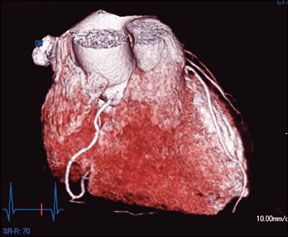A recent study of nearly 2,000 patients undergoing 64-slice CT scans of their hearts, published in the January issue of the Journal of the American Medical Association, found that patients were being exposed to potentially dangerous levels of radiation. Cardiac imaging has made huge strides in recent years, but experts caution that it isnt right for everyone. "Coronary CT angiography (CTA) allows non-invasive imaging of the coronary arteries," says Ronan Curtin, MD, MSc, MRCPI, an associate staff cardiologist in the Section of Cardiovascular Imaging at Cleveland Clinic Heart and Vascular Institute. "It is very accurate for ruling out significant coronary narrowings in patients presenting with chest pain who are at low to intermediate risk of coronary artery disease, both in the outpatient and emergency room setting." Dr. Curtin notes that CTA is particularly useful in patients who are unable to undergo stress testing or in whom stress testing results are inconclusive. "There is a general consensus that coronary CTA is inappropriate as a screening test in patients who are asymptomatic," he notes. "Coronary CTA is also inappropriate in patients who are high risk for coronary artery disease." One of the limitations of coronary CTA is its inability to see through calcium, which is present in chronic plaques and relatively common in older patients. Heavy calcification of the coronary arteries usually results in a non-diagnostic test result. A separate type of CT scan, without contrast administration, commonly referred to as a "calcium score", specifically measures the amount of calcified plaque in the coronary arteries and in asymptomatic patients and can be used to improve risk assessment in patients at intermediate risk for coronary artery disease. "However, evidence is lacking at this time that it can favorably affect patient outcomes. Also patients usually have to pay out of pocket for a calcium score CT," says Dr. Curtin.
To continue reading this article or issue you must be a paid subscriber.
Sign in






